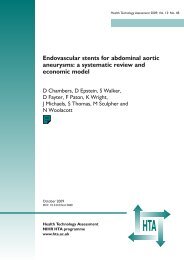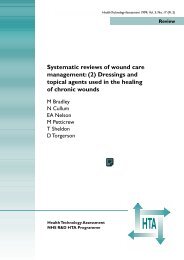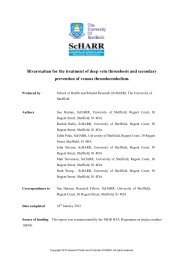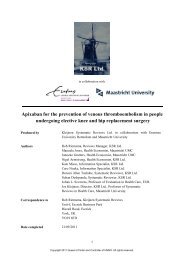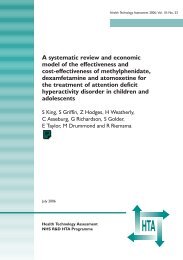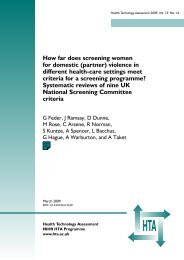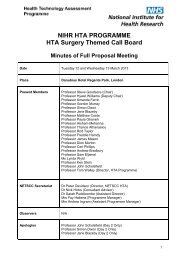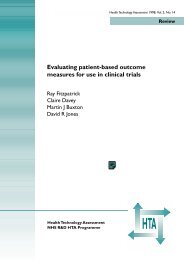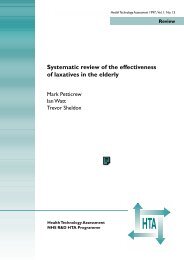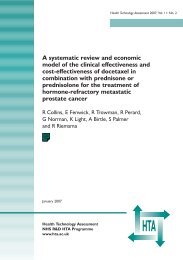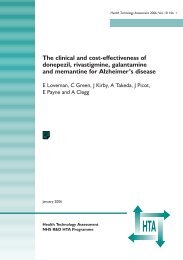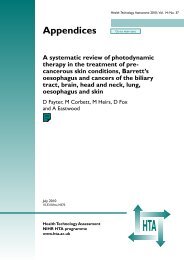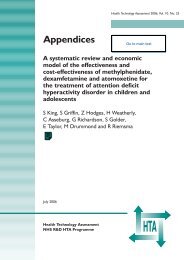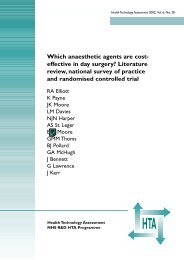- Page 1 and 2: Health Technology Assessment 2003;
- Page 3 and 4: Evaluating non-randomisedinterventi
- Page 5 and 6: Health Technology Assessment 2003;
- Page 7: Health Technology Assessment 2003;
- Page 11 and 12: Health Technology Assessment 2003;
- Page 13 and 14: Health Technology Assessment 2003;
- Page 15 and 16: Health Technology Assessment 2003;
- Page 17: Health Technology Assessment 2003;
- Page 21 and 22: Health Technology Assessment 2003;
- Page 23 and 24: © Queen’s Printer and Controller
- Page 25 and 26: Health Technology Assessment 2003;
- Page 27 and 28: © Queen’s Printer and Controller
- Page 29 and 30: Health Technology Assessment 2003;
- Page 31: Health Technology Assessment 2003;
- Page 36 and 37: Evaluation of checklists and scales
- Page 38 and 39: Evaluation of checklists and scales
- Page 40 and 41: Evaluation of checklists and scales
- Page 42 and 43: Evaluation of checklists and scales
- Page 44 and 45: 32TABLE 8 Details of top 60 quality
- Page 46 and 47: Evaluation of checklists and scales
- Page 48 and 49: Evaluation of checklists and scales
- Page 50 and 51: 38TABLE 10 Other domains: reporting
- Page 52 and 53: Evaluation of checklists and scales
- Page 54 and 55: Evaluation of checklists and scales
- Page 56 and 57: Use of quality assessment in system
- Page 58 and 59: Use of quality assessment in system
- Page 60 and 61: Use of quality assessment in system
- Page 62 and 63: Empirical estimates of bias associa
- Page 64 and 65: Empirical estimates of bias associa
- Page 66 and 67: Empirical estimates of bias associa
- Page 68 and 69: Empirical estimates of bias associa
- Page 70 and 71: Empirical estimates of bias associa
- Page 72 and 73: Empirical estimates of bias associa
- Page 74 and 75: Empirical estimates of bias associa
- Page 76 and 77: Empirical evaluation of the ability
- Page 78 and 79: Empirical evaluation of the ability
- Page 80 and 81: Empirical evaluation of the ability
- Page 82 and 83:
70TABLE 22 Comparison of concurrent
- Page 84 and 85:
Empirical evaluation of the ability
- Page 86 and 87:
74TABLE 26 Comparison of methods of
- Page 88 and 89:
Empirical evaluation of the ability
- Page 90 and 91:
Empirical evaluation of the ability
- Page 92 and 93:
80TABLE 33 Hypothetical example dem
- Page 94 and 95:
82TABLE 34 Hypothetical example dem
- Page 96 and 97:
Empirical evaluation of the ability
- Page 98 and 99:
Empirical evaluation of the ability
- Page 100 and 101:
Discussion and conclusions88histori
- Page 102 and 103:
Discussion and conclusions90For exa
- Page 104 and 105:
Discussion and conclusionsNon-rando
- Page 107 and 108:
Health Technology Assessment 2003;
- Page 109 and 110:
Health Technology Assessment 2003;
- Page 111 and 112:
Health Technology Assessment 2003;
- Page 113 and 114:
Health Technology Assessment 2003;
- Page 115 and 116:
Health Technology Assessment 2003;
- Page 117 and 118:
Health Technology Assessment 2003;
- Page 119 and 120:
Health Technology Assessment 2003;
- Page 121:
Health Technology Assessment 2003;
- Page 124 and 125:
Appendix 1data)) or (non-random$ or
- Page 126 and 127:
Appendix 2AuthorYearENDARESourcePub
- Page 128 and 129:
Appendix 2Author:Accession No:Endno
- Page 130 and 131:
Appendix 20 0 00Additional outcomes
- Page 132 and 133:
Appendix 2Endnote NoWas CMA conside
- Page 134 and 135:
122AuthorOrigin aModified toolTool
- Page 136 and 137:
124AuthorOrigin aModified toolTool
- Page 138 and 139:
126AuthorOrigin aModified toolTool
- Page 140 and 141:
128AuthorOrigin aModified toolTool
- Page 142 and 143:
130AuthorOrigin aModified toolTool
- Page 144 and 145:
132AuthorOrigin aModified toolTool
- Page 146 and 147:
134AuthorOrigin aModified toolTool
- Page 148 and 149:
Appendix 4136DuRant, 1994 99The typ
- Page 151 and 152:
Health Technology Assessment 2003;
- Page 153 and 154:
Health Technology Assessment 2003;
- Page 155 and 156:
© Queen’s Printer and Controller
- Page 157 and 158:
© Queen’s Printer and Controller
- Page 159 and 160:
© Queen’s Printer and Controller
- Page 161 and 162:
© Queen’s Printer and Controller
- Page 163 and 164:
Health Technology Assessment 2003;
- Page 165 and 166:
© Queen’s Printer and Controller
- Page 167 and 168:
© Queen’s Printer and Controller
- Page 169 and 170:
© Queen’s Printer and Controller
- Page 171 and 172:
© Queen’s Printer and Controller
- Page 173 and 174:
© Queen’s Printer and Controller
- Page 175 and 176:
© Queen’s Printer and Controller
- Page 177 and 178:
© Queen’s Printer and Controller
- Page 179 and 180:
Health Technology Assessment 2003;
- Page 181 and 182:
Health Technology Assessment 2003;
- Page 183 and 184:
Health Technology Assessment 2003;
- Page 185:
Health Technology Assessment 2003;
- Page 188 and 189:
Health Technology Assessment Progra
- Page 190:
Health Technology Assessment Progra



